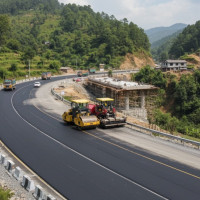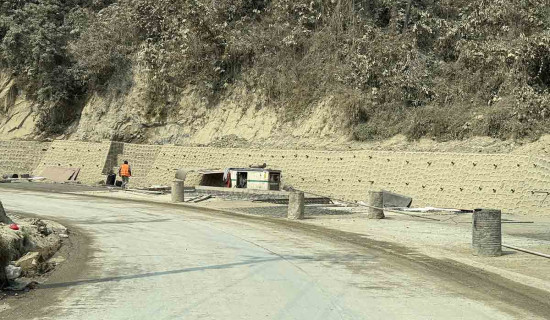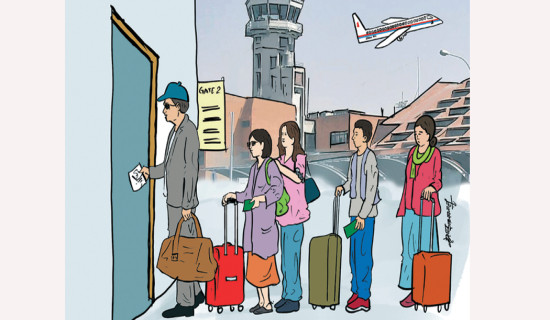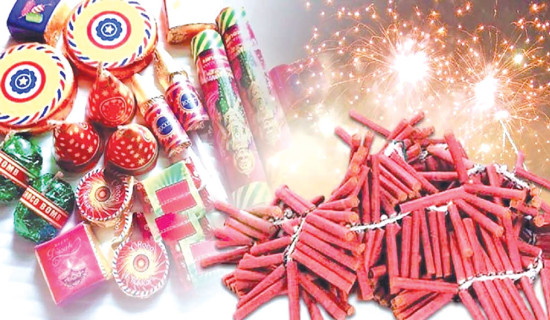- Thursday, 26 February 2026
Honourable rules for national honours
Kathmandu, Aug. 6: On July 6, 2020, the government amended the Decorations Rules-2008 in a bid to make them free from controversy while conferring orders, decorations and medals on various personalities.
The number of decoration recipients has been specified in the revised rules limiting it to not more than 202 persons.
But every year, the number receiving these government-provided civilian awards has been found increasing exponentially.
Such decorations are annually distributed to persons on behalf of the country in recognition and honour of their outstanding contributions to various walks of national lives on Baisakh 1, the first day of the Nepali New Year calendar, as mentioned in the Decoration Recommendation Work Procedure and Criteria to Distribute the Decorations, 2019. The name list of the persons to be decorated with the honours gets published right on Constitution Day, marked every year on Asoj 3.
Every year, the number of persons to be decorated with the honours has been increasing and reached to 998, the highest number of any year, in the year 2021/22, and 993 in 2022/23.
An official at the Decorations Section of the Ministry of Home Affairs said according to the amended regulations, each year just 100 people should have been provided with Orders, and 50 each to be honoured with Alankars and medals.
Order is the highest civilian award in Nepal which is given to only one person in a year. Similarly, Rastra Gaurav Order is the second-highest which is conferred by President to just two dignitaries.
There are mainly four types of honours of Orders. They include - Nepal Ratna, Rastra Gaurav, Rastra Deep and Janasewa Shree. According to the amended rules, there is a classification of medals (padaks). For example, Janasewa Shree begins from the first to the fifth class.
Presently, the government distributes 35 different types of honours, including orders, alankars and medals.
Earlier, the government had been giving away these honours to hundreds of persons, who were close to the authorities concerned and political parties without evaluating their contribution to the nation and people.
There is even a record at the Ministry of Home Affairs that some of the awardees had even refused to receive the orders and medals citing diminishing value, respect and worth of these decorations.
According to the source at the Ministry, over 650 people had not come to receive their honours on different dates. And as per the regulations, those who did not come to get their honours within a year, such orders, decorations and medals would automatically be considered invalid.
Home Ministry had even published a notice in 2021 notifying that as many as 189 people had not come to receive their awards in the past nine years. In case of failure to receive the orders, decorations and medals within the given period, it will be withdrawn,” read regulation no. 45.
Some of them include Daman Nath Dhungana, a senior politician and former Speaker of the parliament, Nilkantha Upreti, Subodh Pyakurel, Kanakmani Dixit, Haribansha Acharya and Madan Krishna Shrestha.
“Persons who could not attend the special function shall have to receive it within one year of such decoration ceremony,” it is mentioned in the Regulation.
Any person convicted of corruption, rape, human trafficking, drug smuggling, money laundering, passport misuse, kidnapping and other offences involving moral turpitude will not be entitled to the honour.
The former chief secretary, a former ambassador and a former Home Secretary Leela Mani Paudyal, said that decorations are annually distributed to make the persons who are close to make them still closer and more loyal to them always.
“Perhaps, Nepal should be the only country where such decorations are distributed based on rank, profile and class, and not based on work and their real contribution,” Paudyal said.
Every ministry and government official gets a quota for honours. The leaders secretly select ‘his/her men/women’ from the quota they receive. And ‘loyal’ employees end up being ‘dishonoured’, not good, competent and honest.
When the country annually starts awarding the people in such big numbers, one day there will be no person who has not received the state’s honour, he said. “Civil servants, security bodies should not be given honour as they should be honoured for their promotion and good performance of their duties by their own office chiefs,” Paudyal said.
Recalling his term as Home Secretary
and as the main person to recommend the names for the decorations to the government as member secretary of the selection committee, Paudyal said that his committee had recommended the names of only 13 persons, includ
ing the name of late Nepali Congress’s senior leader Krishna Prasad Bhattarai to be honoured with Nepal Ratna
order, posthumously. But when the government was not satisfied with the recommendation, that year no decoration ceremony could happen when Jhala Nath Khanal was the Prime Minister in February, 2011.
Daman Nath Dhungana, senior politician and first Speaker of the House of 1990, who himself rejected the government honour and different other prizes at different times, said that the state must be judicious while distributing such state honours to hundreds of people.
“Here a condition has been developed that those who should not have been missed have been missing from getting such honours while those who are not even eligible to get the honours are being honoured,” Dhungana said.
He said that the distributing process of the decorations must be overseen by an independent identification, selection and recommendation committee.
No government has been taking the matter of the increasing number of recipients seriously and it is becoming an ideological to make it more respectful.
“It has been proving that rules are made to break for all the governments whenever their turn comes to sit with executive power,” he said.
In June 2019, then-President Bidya Devi Bhandari awarded Constituent Assembly medals to members of the first and second Constituent Assembly for their significant contribution to the creation of the Constitution. However, 383 out of 1,111 recommended people, the then CA members, did not come to collect the honours each of which were minted by spending at least Rs. 50,000 rupees at that time. Only 728 people, who registered their names for the CA medals, came to get the honours.
When people didn’t come to receive their honours, the Ministry of Home Affairs had to issue the notice on February 6, 2020, and invited them to come and receive the awards.
Hari Bahadur Thapa, a senior journalist, who also rejected the state honour, said that there is a strange scene of even the recommender himself appearing in the list of being decorated. “Nepal might be the only country in the world that has established an example where the recommenders receive the honours,” he said.
Leader Dhungana said that to restore the reputation of orders, alankars and medals, the yearly swelling graph of recipients must be brought down heavily as the state’s coffer is being exploited unnecessarily. “It is enough to honour 20 to 50 people with national honours in a year,” he suggested.
According to Ministry of Home Affairs sources, on average, the government has to spend over Rs. 60 to 80 million a year to mint national orders, decorations and medals. It costs Rs. 1.5 to 2.0 million to mint only Nepal Ratna order, the highest civilian award, according to the fluctuating market prices of gold, silver and diamond.
Nearly 6,000 people honoured in 12 years
In the last 12 years, 5,908 persons including last year’s 993 people, were honoured with various decorations. That means, over Rs. 635 million must have been spent. The value of these decorations differs due to fluctuation in the price of gold, silver and diamond every year.
According to the available record, in the year 2010, the government felicitated 269 persons, the ceremony was skipped in 2011; 164 in 2012; 189 in 2013; 326 in 2014; 303 in 2015; 407 in 2016; 514 in 2017; 518 in 2018; 633 in 2019; 594 in 2020; 998 in 2021; 993 in 2022.
Presently, on behalf of security bodies, 25 persons from the Nepali Army, 20 from the Nepal Police, 12 from the Armed Police Force and a maximum of four from the National Investigation Department are being honoured.
Legal process
According to the Decorations Act 2007, the government forms a committee under the chairmanship of a senior minister to distribute honours every year. Currently, the committee is chaired by Deputy Prime Minister and Minister for Defence.
According to the Decoration’s Work Procedure issued in 2019, officials from the President to the Chief District Officer can recommend for medals. It also has a provision that if someone thinks he/she is eligible for the medal, they can apply individually by filling up the forms.
Why are the numbers increasing?
Narayan Prasad Bhattarai, Joint Secretary and Spokesperson for the Ministry of Home Affairs, said that the government had fully followed the rules and procedures while selecting the names for different orders. He said that there was no need to dispute as the names are selected according to the criteria issued by the government.
Bhattarai further said, “The recommendation and final name list is not made haphazardly; it is recommended after proper assessment of everyone’s contribution.” Viewing from public perception it all looks like a shady affair, but the government (Ministry) receives the final name list as per the recommendations prepared by Ministries,
Divisions, Units and District Administration Offices across the country.



-original-thumb.jpg)


-original-thumb.jpg)










